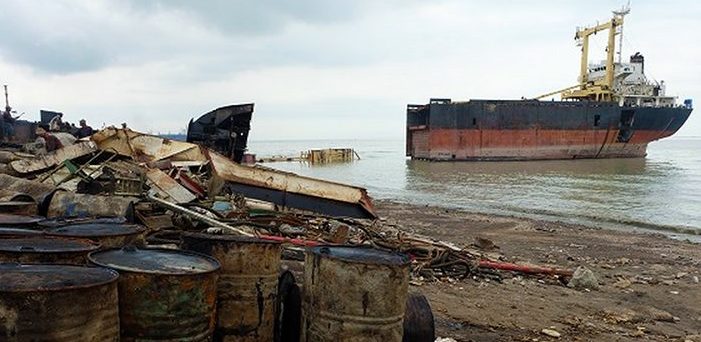Ship Recycling Industry Poised for Revival Amid Regulatory Challenges: Dr.Anil Sharma

The ship recycling industry, long mired in stagnation, is set to witness a resurgence from 2025, according to Anil Sharma, CEO of the world’s largest ship recycling cash buyer, GMS. After three consecutive years of sluggish activity, Sharma projects a significant uptick in ship demolitions, particularly driven by the ageing tanker fleet. However, this revival is not without challenges, as the dark fleet of tankers — vessels operating under opaque trading practices — poses regulatory and compliance risks for recyclers.

Sharma predicts a “massive increase” in ship recycling volumes, primarily fueled by the retirement of older tankers. “There are 1,300 tankers in service above 20 years of age,” he noted. These vessels are nearing the end of their operational lives, making them prime candidates for recycling. However, many of these ships belong to the dark fleet, which has been involved in trading practices that skirt sanctions.
Recycling such vessels comes with the risk of sanctions, not just for their operators but also for the recycling yards and companies involved in their dismantling. “Recycling the dark fleet will be a challenge,” Sharma emphasized, highlighting the need for robust compliance mechanisms.
The ship recycling industry has been experiencing its lowest activity levels since the early 1990s. In 2024, only 275 ships were sent for dismantling globally, mirroring the subdued figures of the previous two years. A combination of strong shipping markets and geopolitical factors has kept older ships in operation.
“Red Sea diversions and geopolitical shifts have benefited containership operators, while tankers trading in the dark fleet and China’s appetite for old capesize bulk carriers have extended the life of vintage vessels,” Sharma explained. These trends have delayed the anticipated surge in recycling activity.
Despite the current lull, Sharma remains optimistic. “Volumes are anticipated to increase in the coming years due to fleet renewal pressures and a rising emphasis on emissions management,” he said. However, the timing will depend heavily on market conditions.
A key factor in the ship recycling equation is the demand for recycled steel. Traditionally, recycled steel from ships has been a valuable resource for construction and manufacturing. However, the Indian subcontinent, a major hub for ship recycling, is witnessing declining demand for recycled steel due to competition from cheap finished steel imports from China.
Amid this challenge, the concept of “green steel” — steel produced from recycled materials using induction furnaces rather than carbon-intensive blast furnaces — is gaining traction. Sharma sees this as a silver lining for the industry.
“Major countries, including those in Europe, are exploring ways to adopt green steel production. Making steel from recycled material is the way forward,” he argued. The push for green steel aligns with global efforts to reduce carbon emissions and promote sustainable practices, offering a potential lifeline for the recycling sector.
A pivotal moment for the ship recycling industry will come in June 2025, when the Hong Kong International Convention (HKC) for the Safe and Environmentally Sound Recycling of Ships comes into force. Sharma, a vocal advocate for the HKC, has been instrumental in assisting shipyards to comply with its stringent requirements.
“The HKC is a game-changer. It provides a globally accepted framework to regulate the recycling industry,” he said. Over the past few years, GMS has been working with shipyards worldwide to ensure they meet HKC standards, helping them transition to sustainable practices.
Despite the industry’s preparation, Sharma anticipates that the true impact of the HKC will only become evident in the years following its enforcement. “It will be interesting to see how it shapes the sector,” he remarked.
In addition to the HKC, regional regulations are also influencing the ship recycling landscape. The United Arab Emirates Ship Recycling Regulation and the European Union Ship Recycling Regulation (EU SRR) are expected to play significant roles in shaping the industry’s future.
While Sharma acknowledges the importance of regional regulations, he believes they should align with the HKC. “Once the HKC is in force, other regulations won’t be necessary. All regulations should dovetail into the HKC,” he argued.
The ship recycling industry stands at a crossroads, poised for significant change in the coming years. On one hand, the ageing global fleet and the push for sustainable practices offer immense growth potential. On the other hand, challenges such as compliance risks, competition from cheap steel, and the implementation of new regulations could pose hurdles.
The recycling of the dark fleet, in particular, will test the industry’s ability to navigate complex compliance landscapes. As Sharma noted, “Ensuring compliance checks for these vessels will be critical to avoid sanctions.”
Yet, despite these challenges, Sharma remains optimistic. The industry’s adoption of the HKC and the growing interest in green steel are promising developments that could pave the way for a more sustainable and regulated future.
With global fleets reaching their highest average age and environmental concerns becoming increasingly central to maritime policies, the ship recycling sector may finally be on the brink of a long-awaited revival.
As 2025 approaches, all eyes will be on how the industry adapts to these changes and seizes the opportunities presented by the evolving regulatory and market landscape.
Author: shipping inbox
shipping and maritime related web portal








